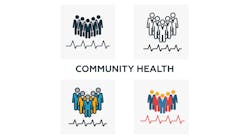L.A. Care eManagement Program Helps Primary Care Screen for Behavioral Issues
In 2016, L.A. Care Health Plan, the nation’s largest publicly operated health plan with more than 2 million members, launched a web-based program called eManagement designed to help primary care providers improve their delivery of behavioral healthcare services. A recent analysis identified cost savings and improved detection of behavioral health conditions.
Primary care providers who agree to participate in the eManagement program can screen patients for anxiety, depression, and alcohol use using a pre-screen tool and a follow-up full screen as appropriate. These providers can also consult with a psychiatrist to ensure that they’re following best practices and to get assistance with medication management as needed. If necessary, primary care providers can use the eManagement platform to refer patients to a behavioral health specialist for a face-to-face consultation. The consultation can also be tracked within the program. L.A. Care says it supports a whole-person approach to care.
The goals of the program include:
• Improving behavioral health screenings;
• Improving the clinical competencies of primary care providers (PCPs) through use of online psychiatric eDialogues; and
• Improving medication management.
The eManagement program provides a three-pronged approach for collaboration of care in medical homes where mental health providers are often in short supply, and further helps identify potential areas for reduction in clinical costs.
The Department of Mental Health (DMH) oversees a contracted specialty network with two to three assigned psychiatrists, and sends responses to PCP inquiries within 24-48 hours. PCPs can receive incentive payments for using evidence-based treatment protocols and screening tools, and the utilization of eDialogues (online discussions).
To assess the effectiveness of L.A. Care’s eManagement program, the “California Health Care Foundation commissioned a firm called JSI to conduct an evaluation. Findings were favorable and informed L.A. Care’s decision to continue and scale eManagement.
JSI noted several successes, including:
• Timely detection of behavioral health conditions and improvement in conditions between visits;
• High provider satisfaction and self-reported increase in knowledge and skills in treating behavioral health conditions;
• Reductions in use of high-cost services (such as emergency department visits) over 18 months; and
• Cost savings from reduced specialty referrals because primary care providers were increasingly able to resolve patient needs.
JSI also noted that while eManagement has enabled access to behavioral health services, opportunities for improvement exist, particularly related to program usage; currently most PCP users are screenings in less than 10 percent of all patient encounters.
JSI made several recommendations for improvement, including:
• Tailoring the program to better suit the needs of smaller practices;
• Improving user-friendliness of certain features to drive routine use of the program; and
• Conducting further analysis to understand the root causes of slight differences in utilization trends by race/ethnicity.


